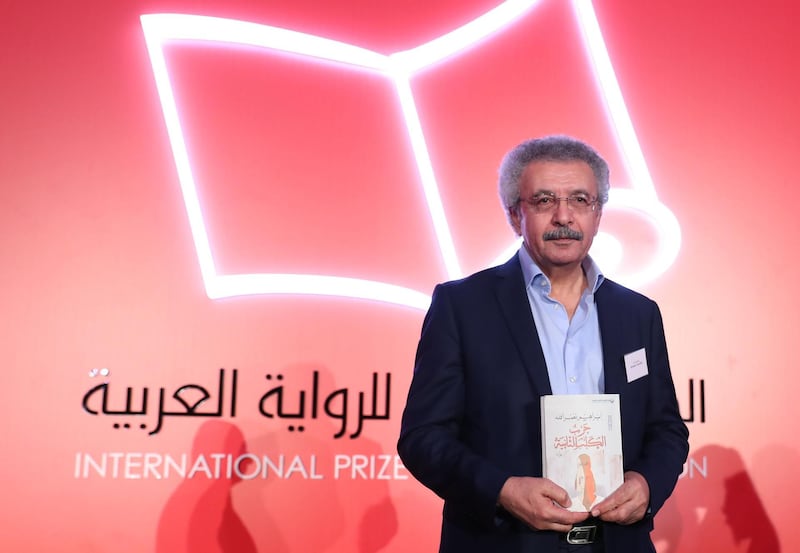In a world of refugees, Ajwan is a refugee without a world. The 19-year-old is the titular character of the Emirati science fiction novel by Noura Al Noman, a coming-of-age book set in a universe where Ajwan's entire planet has been destroyed.
Al Noman was on a panel at the British Library in London last weekend to talk about Arabic science fiction. The themes of Ajwan, she said, were universal – indeed, the novel itself makes no references to Emiratis, Arabs or other real world races. Nonetheless, the novel is rooted in the ideas and cultures of the region.
Arabic science fiction is part of what is sometimes called Arab futurism. At its simplest, Arab futurism is a cultural movement that interprets the future of the Arab world through a whole host of art forms. In some cases, such as Ajwan, the themes are there in the background. In others, such as the art films of Larissa Sansour, currently on show at Dar El Nimer in Beirut, the politics are more overt.
Arab futurism is certainly having a cultural moment, as evidenced by Palestinian author Ibrahim Nasrallah winning the International Prize for Arabic Fiction (IPAF) last week for his dystopian novel The Second War of the Dog. That was the reasoning behind the panel, held as part of MFest, an exploration of Muslim ideas and cultures.
Nasrallah's book, in fact, highlights one of the reasons why Arab futurism has become so exciting – and why it remains an important and powerful tool for interpreting the Arab world as it currently is.
The Second War of the Dog takes place in a country that is never named but its themes of war, extremism and the excesses of capitalism can find resonance across the Middle East today. Nasrallah himself was explicit that the novel "suggests that if we continue on our current path, we will become mostly annihilistic", suggesting not only an element of political commentary to the novel but also situating it in a fictional world that bears similarities to our own.
That ability to shed light on social and political issues in the present while also projecting the consequences of a current society into the future is what makes Arab futurism so important as a genre.
For those who are interested in the societies and politics of the Middle East, using the structure – or really, the lack of structure – of a fantasy allows the essence of the reality to shine through.
Take, for example, Frankenstein in Baghdad by Ahmed Saadawi, which won the IPAF in 2014 and whose English translation received impressive reviews earlier this year. The Iraq Saadawi portrays is as it existed after the war up until the present day, mired in conflict and dealing with the consequences of a foreign invasion, but the fantasy of a Frankenstein creature built from the remains of those who have been killed in the war allows the reader to see the reality of the war more clearly. Sometimes too much reality can obscure.
________________
Read more from Faisal Al Yafai:
[ Chemical warfare might just be one of the worst legacies of the Syrian war ]
________________
The writer who was best at this was Ahmed Khaled Towfik, who died last month at the age of 55. Towfik was probably the best known and most prolific science fiction writer from the Arabic-speaking world, with his most famous work Utopia published in multiple languages and sitting on the curriculum of western universities.
Utopia was explicitly political, set in a Cairo of a not-too-distant future in which a gilded elite must perform a coming-of-age test by hunting poor citizens beyond their walls and bring back limbs as trophies. Unsurprisingly, it drew comparisons with The Hunger Games.
But Towfik didn't take as his inspiration something fantastical. He was actually motivated by the prosaic. In an interview in 2015 with the curator Yasmin Khan, he revealed that his inspiration had been the book Whatever Happened to the Egyptians? by Galal Amin, an Egyptian economist. The book is little-known outside academic circles but is considered a staple of social studies, charting the vast rise in inequality in Egyptian society over the second half of the 20th century.
It is that aspect of Arab futurism that is most intriguing: its ability to speak to the present. Seeing Arabic science fiction only and always as social commentary would be limiting, of course, but it is important that some of the best artists of the genre have tackled overtly political themes. It is impossible to see the greed of the elite in Utopia – published in 2008 – without also feeling it predicted the revolution three years later.
And yet Arab futurism, for all its intriguing possibilities, still struggles to find a large and popular audience. With the exception of stars like Towfik, much of the literature and art of the genre is not popular and does not have the mass appeal of, for example, The Hunger Games, both the novels and movies.
Part of that might simply be a question of taste. Of the sweeping, cinematic Mosalsalat soap operas that are shown on Arabic TV channels every Ramadan, I’m unaware of any that focus on science fiction or completely imagined worlds. Historical dramas are much more popular, which might simply be a matter of current audience tastes.
But if so, that is a shame. Because while both science fiction and historical dramas can provide escapism, they can also both provide important social commentary. These historical dramas allow an analysis of the current social predicament by way of comparison with societies of the past but futurism allows a prediction of the Arab future if it continues on its current trajectory.
By creating a world that is almost – but not quite – unmoored from the current reality of the Middle East, these works have a great to deal to say about the present, even if they say it in the language of the future.





